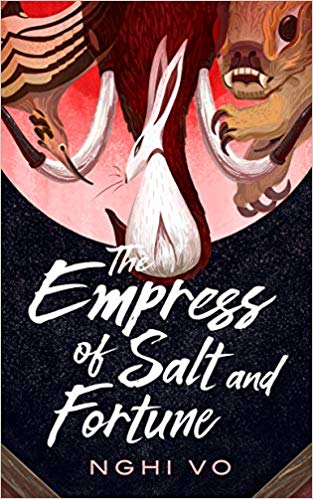 The Empress of Salt and Fortune (Singing Hills Cycle #1) by Nghi Vo
The Empress of Salt and Fortune (Singing Hills Cycle #1) by Nghi Vo Format: eARC
Source: supplied by publisher via NetGalley
Formats available: paperback, ebook
Genres: fantasy, historical fantasy
Series: Singing Hills Cycle #1
Pages: 122
Published by Tordotcom on March 24, 2020
Purchasing Info: Author's Website, Publisher's Website, Amazon, Barnes & Noble, Kobo, Bookshop.org
Goodreads
With the heart of an Atwood tale and the visuals of a classic Asian period drama The Empress of Salt and Fortune is a tightly and lushly written narrative about empire, storytelling, and the anger of women.
A young royal from the far north, is sent south for a political marriage in an empire reminiscent of imperial China. Her brothers are dead, her armies and their war mammoths long defeated and caged behind their borders. Alone and sometimes reviled, she must choose her allies carefully.
Rabbit, a handmaiden, sold by her parents to the palace for the lack of five baskets of dye, befriends the emperor's lonely new wife and gets more than she bargained for.
At once feminist high fantasy and an indictment of monarchy, this evocative debut follows the rise of the empress In-yo, who has few resources and fewer friends. She's a northern daughter in a mage-made summer exile, but she will bend history to her will and bring down her enemies, piece by piece.
My Review:
This was lovely. And fascinating. I have the feeling I’ll need to read it again to have even a shot at picking up everything there is to pick up from this tiny and perfect little story.
It feels like the creation of a myth – or the exploration of one. It reads like it’s a bit of hidden history – a history that has been suppressed and that, of necessity, will continue to be suppressed.
From one perspective, it’s the story of all the women who have been lost to history – all of the lost and the murdered and the exiled and especially the silenced. It’s a tale as old as time, but not one of the pretty ones.
It’s the story of a princess bartered away for peace between two kingdoms, a princess who is cast into exile and imprisonment when her days of usefulness are over. And it is all the tragedy that the scenario implies.
At the same time, it’s a story about not just fighting back, but actually about triumphing over one’s oppressors. About taking what are supposed to be the ruins of a life and turning them into something sharp and pointed and ultimately victorious.
It’s a story about being forced into the shadows and becoming the knife that strikes from the dark.
An empress is forced into exile. Instead of taking her exile in any of the ways that exiled empresses usually do, she finds a way to turn the tables on her oppressor – by gathering up the talents of all the forgotten ones in the land she will come to rule.
But this isn’t her story. Not exactly.
It’s the story of her faithful servant, handmaiden and secret lover. The story of the woman who befriended and enabled her, and who sacrificed her own happiness to make her rise possible.
So it feels a bit like a historical fable, in the setting of an Asian period drama. It also has something to say about history, how it’s written, how it’s discovered, how it’s preserved.
Whether the teller of that history is a ghost, a spirit or just one of those forgotten voices is left to the reader to decide.
But whoever is telling this story, or discovering it, or recording it, it’s beautiful and haunting every step of its way.
Escape Rating A-: It took me a bit to get into this, quite likely because it wasn’t what I was expecting. The story is not told in a straightforward fashion. Instead it’s dribbled out in little sips and small bites, as the former handmaiden – or her ghost or spirit – reveals it bit by bit to the historian who has come looking for artifacts to document the hidden facets of an all-too-recent history.
It reads like a legend, like a myth or story being told, with hints and oblique views and a lesson that’s meant to be inferred rather than explained.
There’s certainly a feminist bent to it if you look, as all of the major characters are female and this is definitely a story where the woman who was supposed to fade into obscurity instead takes control – and is extremely subversive but effective at it.
In the end, the empress creates her own myth, and we’re reading that myth as it’s told by the person who helped to create and shape it. There’s a lyrical quality to the telling that doesn’t so much grab the reader as insinuate itself into the reader’s consciousness.
Although this is labelled as fantasy, it’s fantasy of the mythic variety. It’s fantasy because it’s not SF and it’s not anything else – not because there is any practicing magic. But magic there definitely is.




















2 thoughts on “Review: The Empress of Salt and Fortune by Nghi Vo”
Comments are closed.